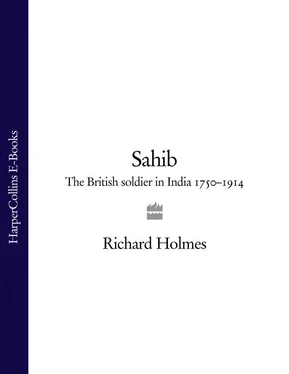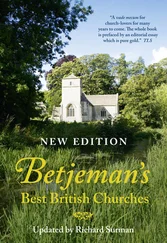At about 6.00 a.m. the first shots are fired. One young artillery officer is to remember the scene well:
On that day, when I first smelt powder, I served with the heavy howitzers and I can never forget the moment when old Gough (who was there in person) sent the order to ‘open fire’. No 1 fire! No 2, 3, 4, 5, 6. Six 10-inch shells hurtled through the mist just lifting, and could be seen in the still dark morning light, bursting in the enemy’s camp and entrenchments. A minute’s pause, and then the hum of a surprised camp like a vast hive, followed by the drums beating to arms, and the trumpets of the Sikh host sounding the alarm. 10
Bombardier Nathaniel Bancroft, serving with a rocket battery this day, later recalled how:
The action commenced by a salvo from the guns, howitzer, mortar and rocket batteries. Such a salvo was never heard in the length and breadth of India before … and the reports of the guns were distinctly heard by the wounded in the hospital at Ferozepur, five and twenty miles away. Our light guns opened fire near Chota Sobraon with a battery of howitzers, and before half past six the whole of our cannonade was developed and every iron-throated gun, mortar and rocket battery … was raining a storm of missiles which boomed, hissed and hurtled through the air onto the trenches of the Sikhs. 11
The excellent quality of Sikh artillery was no surprise to the British even before the war. In 1839 Captain the Hon. W. G. Osborne had been on an official visit to the Sikhs, and reported that although their European-trained infantry was perfectly adequate, their artillery was ‘by far the best and most powerful arm of the Sikh nation’. Its performance, firing grapeshot at a curtain 200 yards away, he thought:
would have been creditable to any artillery in the world. At the first round of grape, the curtain was cut clean away, and their shells at eight hundred and twelve hundred were thrown with a precision that is extraordinary when the short period of time they have known of even the existence of such a thing is taken into account. 12
Mudki and Ferozeshah had demonstrated that Sikh gunners were not simply professionally adept, but were brave men too: they fought to the death even when their batteries were overrun by British infantry. Today at Sobraon they fire back with accuracy and determination, but the British artillery, too, is well handled. Private John Pearman, watching it all with the 3rd Light Dragoons, saw that ‘most of our artillery and field batteries had advanced to an easy range. The firing appeared like practice in Woolwich marshes.’ His regiment, on hand for pursuit when the Sikhs begin to give way, was not quite out of range. ‘We had in the regiment a half-breed greyhound,’ he recalled, ‘and the poor thing kept running after spent balls until the poor bitch could run no more, but she was not hurt.’ 13
At the very moment that when Harry Smith, looking at the bombardment from beyond the eastern edge of the Sikh position, thinks that British artillery is beginning to win the firefight, its fire perceptibly slackens. Gough has just been told that his guns have brought far fewer rounds into the field than had been ordered, and the bombardment cannot go on much longer. 14For Gough this comes as something of a relief from politicking and technical advice, and he decides to bring the battle, as he puts it, ‘to the arbitrament of musket and the bayonet’.
The prospect of another ghastly slogging match like Mudki or Ferozeshah has alarmed Hardinge, and Colonel Benson, one of his staff officers, gallops up to Gough with the suggestion that if he does not feel confident of succeeding without great loss he should break off the attack and treat the business as a siege, making deliberate approaches to the Sikh defences. Benson presses his point again, and when he ventures it a third time Gough explodes. ‘What! Withdraw the troops after the action has commenced, and when I feel confident of success,’ he roars. ‘Indeed I will not. Tell Sir Robert Dick to move on, in the name of God.’ 15
Bombardier Bancroft saw how Dick’s infantry, flanked by batteries of artillery,
moved to the close attack in magnificent order the infantry and the cannon aiding each other co-relatively. The former marched steadily in line, with its colours flying in the centre, and halting only to close in and connect where necessary; the latter taking up their respective positions at a gallop, until all were within three hundred yards of the Sikh batteries; but notwithstanding the regularity, the soldier-like coolness, and the scientific character of the assault … so terrible was the roar of musketry, the fire of heavy cannons, and of those pestilential little guns called ‘zumboorucks’ and so fast fell our dead and wounded beneath them all that it seemed impossible that the trenches could ever be won … But very soon the whole of our centre and right could see the gallant soldiery … swarming in scarlet masses over the banks, breastworks and fascines, driving the Sikhs before them within the area of their own defences over which the yellow and red colours of the 10th and 53rd were flying; and no less gallant was the bearing of the 43rd and 59th Native Infantry, who were brigaded with them and swept in with them ‘shoulder to shoulder’. 16
‘Oh what a sight to sit on your horse,’ wrote John Pearman, ‘to look at those brave fellows as they tried several times to get into the enemy’s camp; and at last they did, but oh, what a loss of human life. God only knows who will have to answer for it.’ 17
The Sikh soldier Hookum Singh watched the same awesome spectacle from behind his zumbooruk on the rampart:
Nearer and nearer they came, as steadily as if they were on their own parade ground, and in perfect silence. A creeping feeling came over me; this silence seemed so unnatural. We Sikhs are, as you know, brave, but when we attack we begin firing our muskets and shouting our famous war-cry, but these men, saying never a word, advanced in perfect silence. They appeared to me as demons, evil spirits, bent on our destruction, and I could hardly refrain from firing.
At last the order came, ‘Fire’, and our whole battery as if from one gun fired into the advancing mass. The smoke was so great that for a moment I could not see the effect of our fire, but fully expected that we had destroyed the demons, so, what was my astonishment, when the smoke cleared away, to see them still advancing in perfect silence, but their numbers reduced to about one half. Loading my cannon, I fired again and again, making a gap or lane in their ranks each time; but on they came, in that awful silence, till they were within a short distance of our guns, when their colonel ordered them to halt and take breath, which they did under a heavy fire. Then, with a shout, such as only angry demons could give and which is still ringing in my ears, they made a rush for our guns, led by their colonel. In ten minutes it was all over; they leapt into the deep ditch or moat to our front, soon filling it, and then swarming up the opposite side on the shoulders of their comrades, dashed for the guns, which were still defended by a strong body of our infantry, who fought bravely. But who could withstand such fierce demons, with those awful bayonets, which they preferred to their guns – for not a shot did they fire the whole time – then, with a ringing cheer, which was heard for miles, they announced their victory. 18
The cheer was premature. The Sikhs ‘took not the slightest notice’ of the fire of skirmishers thrown forward, on Gough’s orders, by Gilbert and Smith, but concentrated their efforts on counter-attacking Dick’s division, which was gradually forced back, out of the captured batteries. Sir Robert himself, a veteran of the Peninsular War, had already fallen, shot through the head. Gough’s plan lay in ruins, but he immediately ordered Gilbert and Smith to convert their feint attacks into real ones. As Gilbert’s men moved forward against earthworks so high that they could not be climbed without scaling ladders, even Gough’s courage faltered briefly. ‘Good God,’ he exclaimed. ‘They’ll be annihilated.’ Ensign Percy Innes, of the Bengal European Regiment, attacking with Gilbert’s division wrote of how:
Читать дальше












